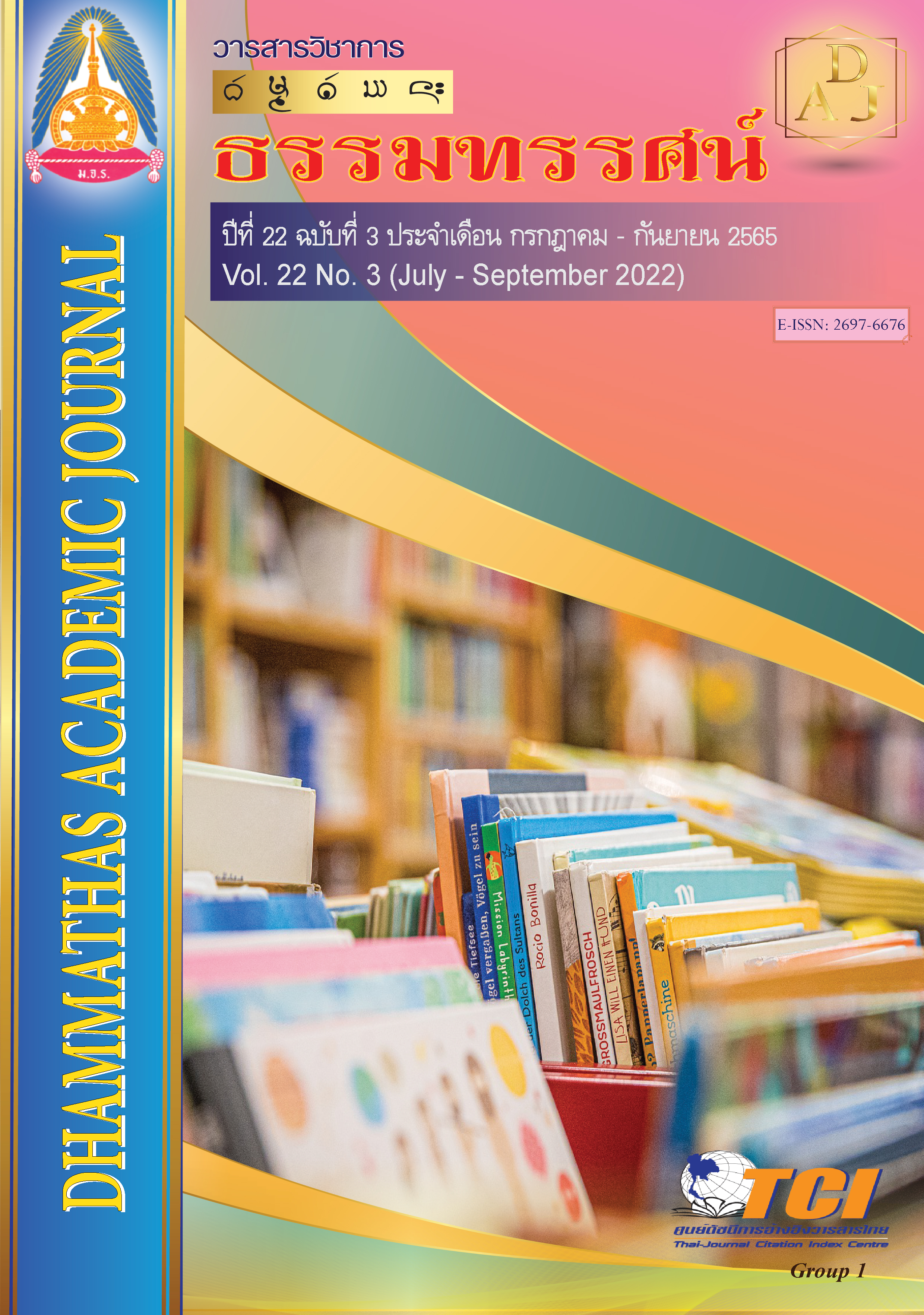A Study of Insulting Expressions and Social Values of the Characters in Popular Thai Soap Opera Scripts in 2019
Main Article Content
Abstract
The purposes of this study were: 1) to study the expressions from insulting expressions of the characters in Thai soap opera scripts, and 2) to study the social values from insulting expressions of the characters in Thai soap opera scripts. The scope of the study were 3TV soap operas, namely: Pu Bao Indy Yayee Inter (Mister Indy Honey Hipster), Sarawat Yai (The Chief Inspector), and Krongkam (The Karma Cage).The study method was selecting the data from the dialogues of every character, then analyzing the data into the descriptive analysis and drawing the conclusion.
The results were as follow:
1. The insulting words from popular Thai soap opera scripts can be categorized into 3 types. There were the use of the insulting language 1) to express a negative abstraction, 2) to express physical ugliness, and 3) to devalue the others. The characteristics of the insulting idioms found in 5 types. There were insulting idioms about 1) behavior and action, 2) abusive speaking manner, 3) ingratitude and sociality with friends and foes, 4) anger, and 5) insult and chastening others about their bad behavior.
2. The social values found in 3 characteristics. The values were about 1) being membership in Thai society’s expectation, 2) foreseeing performance, and 3) the inequality in society.
Article Details

This work is licensed under a Creative Commons Attribution-NonCommercial-NoDerivatives 4.0 International License.
เพื่อให้เป็นไปตามกฎหมายลิขสิทธิ์ ผู้นิพนธ์ทุกท่านต้องลงลายมือชื่อในแบบฟอร์มใบมอบลิขสิทธิ์บทความ ให้แก่วารสารฯ พร้อมกับบทความต้นฉบับที่ได้แก้ไขครั้งสุดท้าย นอกจากนี้ ผู้นิพนธ์ทุกท่านต้องยืนยันว่าบทความ ต้นฉบับที่ส่งมาตีพิมพ์นั้น ได้ส่งมาตีพิมพ์เฉพาะในวารสาร วิชาการธรรม ทรรศน์ เพียงแห่งเดียวเท่านั้น หากมีการใช้ ภาพหรือตารางของผู้นิพนธ์อื่นที่ปรากฏในสิ่งตีพิมพ์อื่นมาแล้ว ผู้นิพนธ์ต้องขออนุญาตเจ้าของลิขสิทธิ์ก่อน พร้อมทั้ง แสดงหนังสือที่ได้รับการยินยอมต่อบรรณาธิการ ก่อนที่บทความจะได้รับการตีพิมพ์References
กุหลาบ มัลลิกะมาส. (2524). วรรณคดีวิจารณ์. กรุงเทพฯ: มหาวิทยาลัยรามคำแหง.
เต็มสิริ บุณยสิงห์. (2562). แนวคิดไทยในเอกสารการสอนชุดวิชา หน่วยที่ 1-6. (พิมพ์ครั้งที่ 18). นนทบุรี: มหาวิทยาลัยสุโขทัยธรรมาธิราช.
นิพนธ์ เที่ยงธรรม. (2562). กรงกรรม. เข้าถึงได้จาก https://mgronline.com/drama/detail/9620000015257
บุญเหลือ เทพยสุวรรณ, หม่อมหลวง. (2517). วิเคราะห์รสวรรณคดีไทย. กรุงเทพฯ: โครงการตำราสังคมศาสตร์และมนุษยศาสตร์.
ผ่องพันธุ์ มณีรัตน์. (2561). แนวคิดไทย ในเอกสารการสอนชุดวิชา หน่วยที่ 7-15. (พิมพ์ครั้งที่ 18). นนทบุรี: มหาวิทยาลัยสุโขทัยธรรมาธิราช.
รัญชนีย์ ศรีสมาน. (2552). บทบริภาษในบทละครนอก: ภาพสะท้อนค่านิยมไทย. วารสารมนุษยศาสตร์, 16(2), 8-21.
ราชบัณฑิตยสถาน. (2556). พจนานุกรมฉบับราชบัณฑิตตยสถาน พ.ศ. 2554. กรุงเทพฯ: นามมีบุ๊คส์พับลิเคชั่นส์.
วรวรรธน์ ศรียาภัย. (2552). รูปภาษาที่ใช้อ้างถึงตัวแสดงบทบาทในวรรณคดีร้อยกรองไทย. (วิทยานิพนธ์ปรัชญาดุษฎีบัณฑิต). มหาสารคาม: มหาวิทยาลัยมหาสารคาม.
วสิษฐ เดชกุญชร. (2562). สารวัตรใหญ่. เข้าถึงได้จาก https://mgronline.com/drama/detail/9620000002798
วิไล ธรรมวาจา. (2549). บทบริภาษ: ถ้อยคำสำนวนที่สะท้อนค่านิยมในสังคมไทย. วารสารศิลปศาสตร์ปริทัศน์, 1(2), 48-56.
วิสันต์ สุขวิสิทธิ์. (2547). วัจนกรรมการบริภาษในภาษาไทย. (วิทยานิพนธ์อักษรศาสตรมหาบัณฑิต). กรุงเทพฯ: จุฬาลงกรณ์มหาวิทยาลัย.
สมเกียรติ รักษ์มณี. (2551). ภาษาวรรณศิลป์. (พิมพ์ครั้งที่ 3). กรุงเทพฯ: สายน้ำใจ
สมบูรณ์ ศรีระสันต์. (2542). บทบริภาษ ถ้อยคำสำนวนที่สะท้อนค่านิยมในสังคมไทย. วารสารศิลปศาสตร์ปริทัศน์, 1(2), 48-56.
สลา คุณวุฒิ. (2562). ผู้บ่าวอินดี้ ยาหยีอินเตอร์. เข้าถึงได้จาก https://mgronline.com/drama/detail/9620000057118
อรทัย ชินอัครพงศ์. (2557). การศึกษาคำด่าในภาษาไทยตามแนวอรรถศาสตร์พันธุ์และวัจนปฏิบัติศาสตร์. (วิทยานิพนธ์ศิลปศาสตรดุษฎีบัณฑิต). พิษณุโลก: มหาวิทยาลัยนเรศวร.
อริยานุวัตน์ สมาธยกุล. (2564). พจนานุกรมสำนวนไทย. มหาสารคาม: มหาวิทยาลัยราชภัฏมหาสารคาม.
อัญมณี ภักดีมวลชน. (2562). การกำหนดกรอบเพื่อให้ความหมายของความเป็นแม่ ในละครโทรทัศน์เรื่อง “กรงกรรม”. วารสารการสื่อสาร มหาวิทยาลัยราชภัฏเชียงราย, 2(2), 68-97.

